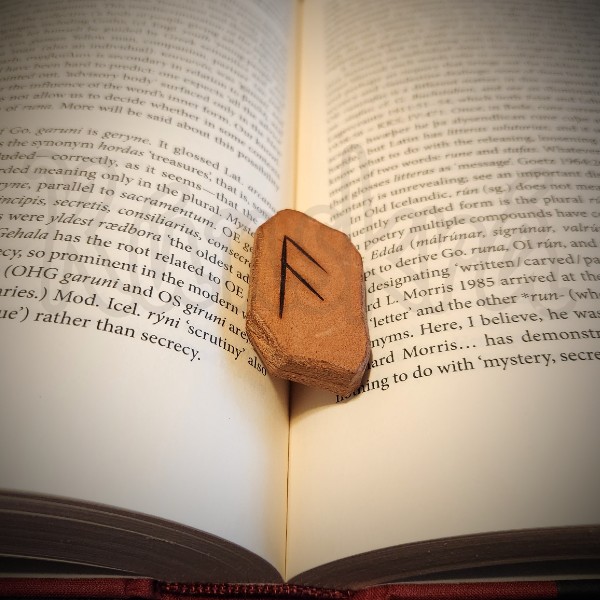
Rune Poems
✦ Old English Rune Poem
The mouth is font,
the meaning maker,
brain bolster,
cozies the crafty—
for anyone who’s got it,
a fruit both future and back.
✦ Old Icelandic and Latin
Oss er aldingautr, Valhallar visir, Asgards Jǫfurr.
Oss, Odinus: princeps Gothorum, aulas inferorum imperator,
Asgarthiae rex.
✦ Norwegian Rune Poem
Estuary is the way of most journeys;
but a scabbard is of swords.
✦ Icelandic Rune Poem
Aged Gautr
and prince of Ásgardr
and lord of Valhalla.
Ansuz is the name of the A-rune of the Elder Futhark, likely from the Neo-Etruscan letter A and the Phoenician “aleph.” The futharks are unusual among world alphabets in that the first letter is not the A-sound; here, A is the fourth letter. Ansuz, “deity,” is the Proto-Germanic form of the word Æsir, the gods—specifically the land-gods, as opposed to the sea-gods, the Vanir.
This is the rune of Óðinn’s mouth: the font of poetry, the source of runic lore, the mouth of the river upon which adventures are borne. Note the name aldingautr in the Icelandic rune poem: “aldi” (old) + “Gautr,” one of Óðinn’s many names. It links Óðinn to the Geats of Sweden and to the Proto-Germanic verb meaning “to pour,” just as Óðinn dispenses wisdom—most famously when he stole the Mead of Poetry from the giant Suttungr.
The rune poems do not fully agree. To the Old Norwegian, Ansuz represents an estuary, where many journeys begin. The Icelandic poem emphasizes Óðinn as ruler of Ásgardr and Valhalla. The Old English poem extols the gift of speech itself. The Latin source darkens the tone, invoking Óðinn as ruler of the underworld halls—an echo of his older, chthonic origins.
Ansuz is invoked when eloquent speech is needed or magic is to be pronounced. It heralds messages, inspiration, prophecy, and the opening of intuition. This is a rune of listening as much as speaking: to dreams, to nature, to the quiet signals beneath daily noise.
Words can heal or wound, bind or liberate. Ansuz reminds us that speech is sacred breath. Speak truly. Listen deeply. Name things by their true names.
Keywords: Communication, Communion, Truth, Honesty, Eloquence, Deity
Rune Reflections
- Where in my daily life do I speak with true authority—rooted not in ego, but in wisdom?
- Am I making room to receive inspiration, or am I drowning it out with noise?
- Where do I trade clarity for comfort?
- What practices open me to sacred speech?
- Who or what do I listen to most deeply—and are they worthy of that attention?
- How do my words build or break trust?
- If Ansuz is the god’s breath within me, what offering do I make in return?